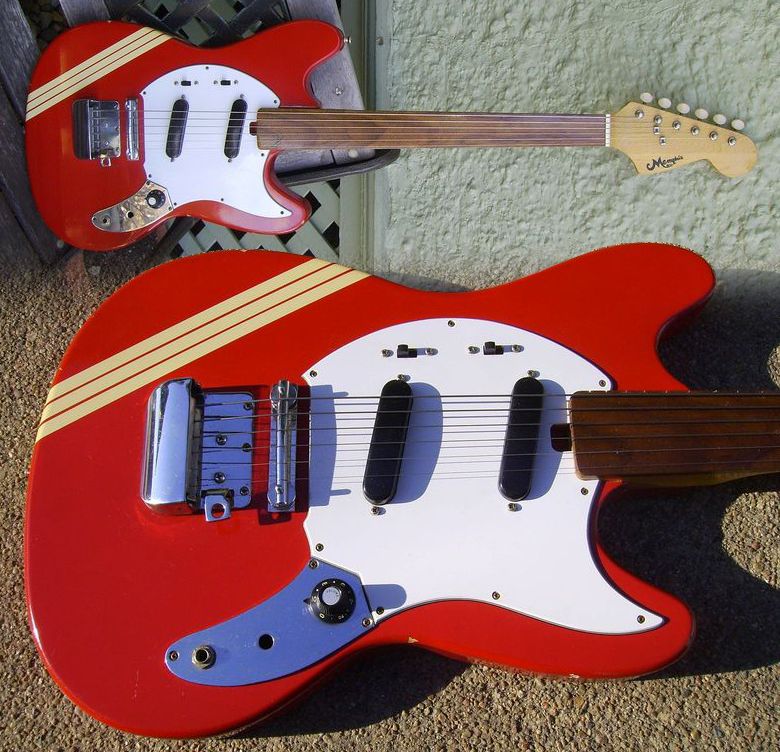guitarz.blogspot.com:
We've looked at a 1960s/70s Japanese-made Mustang copy before here on Guitarz but this Memphis-branded example currently listed on eBay is a bit more interesting. The body shape on the Memphis is still too crude and slab-like with not enough rounding over of the edges, and the pickguard looks like it should belong to an even-waisted guitar rather than one with an offset body like this. However, the guitar has been converted to fretless and this is what makes it interesting. Whoever has done this conversion seems to have made a nice job of it. They haven't merely lifted out the old frets and filled in the slots; it would appear that the whole fingerboard (you can't call it a fretboard on a fretless!) has been replaced. Note the discreet fret position markers along the bass edge of the fingerboard.
I understand I might be confusing some readers out there. In the previous post I was complaining about the desecration of vintage guitars with thoughtless customisations, but here I would seem to be applauding it. It's a very difficult topic, I guess, and we need to remember that often when such "customisations" were carried out a long time ago before the guitars in question could even have been considered one-day potentially "vintage" material by anyone. In my eyes the Japanese Mustang copy, being a real cheapy and not a particularly good "copy", would have been fair game for modification. If I wanted to customise a guitar today, I would avoid what were obviously quality instruments and choose something generic and commonplace from China or Korea perhaps. I guess that back when the Yamaha SG-12 we looked at yesterday was originally modified it wasn't considered to be a guitar of any particular importance or rarity because it was only something "Made in Japan".
But there's Made in Japan and there's Made in Japan. There are the quality guitars and then there's the cheap rubbish. Sometimes it can take some finesse to spot which is which as it is not always screamingly obvious. For example, some early Japanese Telecaster copies are not copied too accurately but are very nice players. (I wouldn't be too surprised if someone comments below that these Memphis Mustangs are also "nice little players", but I still wouldn't consider them the most exciting of "vintage" finds.) In fact, nowadays, I would be wary of butchering any MIJ guitar, because it seems that even the lowliest unplayable Teiscos (or Woolworths guitars as we used to call them) have their fans and now can fetch more money than they originally retailed for.
There are, I'm afraid, no definitive answers about which guitars are ripe for modification; which of today's guitars might be future classics, highly sought after "Holy Grails" even, and which will be considered firewood. I guess it all boils down to the fact that the owner has paid money for the guitar and it is theirs to do with as they please; some people will like it, others won't.
I have to wonder if in 20 or 30 years time, guitar enthusiasts will be searching vainly for an unadulterated Squier '51 and bemoaning the fact that this guitar was a favourite for modification and that an example in original factory condition is near impossible to find.
I suppose that on the Memphis Mustang, if a collector wanted it badly enough in near to original condition as possible, it would be possible to re-fret it. The fingerboard wouldn't be original but it would almost certainly be of better quality than the original! Anyway, this guitar is currently listed on eBay - the auction finishes later today and bidding is at $142.50 at the time of writing.
G L Wilson
© 2012, Guitarz - The Original Guitar Blog - now in its 10th year!


MATSUMOKO 60s
ReplyDelete